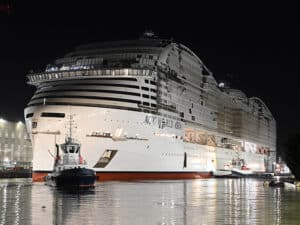
Coral Expeditions manages biofouling with graphene coatings and robotic cleaning
Written by Nick Blenkey
Photo: GIT Coatings
In a cruise industry first, Australian expedition cruise specialist Coral Expeditions is to use a combination of robotic hull cleaning and graphene-based hard foul release coatings from GIT Coatings on its 2019-built, 93.5 meter expedition ship Coral Adventurer.
In April, the 120-passenger ship was initially coated with two of GIT’s graphene-based hard foul release coatings. Its hull was coated with XGIT-FUEL and its propellers with XGIT-PROP.
XGIT-FUEL is a graphene-based hard foul release hull coating that creates an ultra-low friction surface to increase vessel efficiency, and its patented XGIT technology secures a hydrated layer that deters the settlement and attachment of biofouling. It was also recently adopted by leading Finnish shipping passenger operator, Finnlines across its RO/RO and ROpax fleets.
XGIT-PROP is a highly durable graphene-based hard foul release propeller coating that helps to improve vessel performance by keeping the propeller smooth over time. GIT says it is the most efficient and simplest way to improve CII ratings. In March, leading dry bulk company, Pacific Basin adopted the coating across its entire fleet.
At the time the XGIT coatings were applied to Coral Adventurer, Coral Expeditions managing director Mark Fifield noted the extended lifespan of the coatings and resulting reduced maintenance intervals and consistent performance throughout prolonged operational periods due to an ultra-low friction surface, post docking.
Fifield also emphasized the importance of the biocide-free aspect of GIT Coatings sustainable foul release technology, which does not leach any toxins such as copper and silicone-oils into the ocean.
“These advancements exemplify Coral Expeditions’ dedication to pioneering sustainable practices within the expedition cruising sector,” he said. “Coral Adventurer is leading the charge towards a brighter future for marine technology.”
To minimize the transfer of invasive species, the Australian Hull Biofouling Management Regulation, which is now in effect, has established new requirements for managing biofouling on vessels arriving in Australia. Operators of all vessels subject to biosecurity control will be required to provide information on how biofouling has been proactively managed prior to arriving in Australian territorial waters.
To keep the hull free of fouling over time while adhering to biofouling regulations, Coral Expeditions is pairing the use of biocide-free coatings with periodic in-water robotic hull cleanings. Implementing this process results in the vessel spending less time in dry dock, ensuring it remains on schedule for cruise passengers.
Working in collaboration, GIT and Coral Expeditions created a hull cleaning schedule that was easy to maintain and aligned with the company’s operations.
“This represents the future of marine coatings,” said GIT Coatings CEO Mo AlGermozi. “We are pioneering a shift towards more sustainable operations, eliminating toxic biocides and silicone oils, while maintaining peak performance. Additionally, we are overcoming the durability limitations of traditional silicone technologies. Our partnership with Coral Expeditions will showcase the transformative potential of the real sustainable coatings industry.”

![The new Prestige-class vessel will be a sister ship to Seven Seas Prestige, set for delivery in 2026. A second ship in the same class is already scheduled for delivery in 2030. [Image: Regent Seven Seas Cruises]](https://www.marinelog.com/wp-content/uploads/2025/11/sevenseaspresttige-300x225.jpg)
![MSC Magnifica entering Palumbo Malta Shipyard. [Photo: MSC Cruises]](https://www.marinelog.com/wp-content/uploads/2025/10/MSC-Magnifica-entering-Palumbo-Malta-Shipyard-300x225.jpg)

